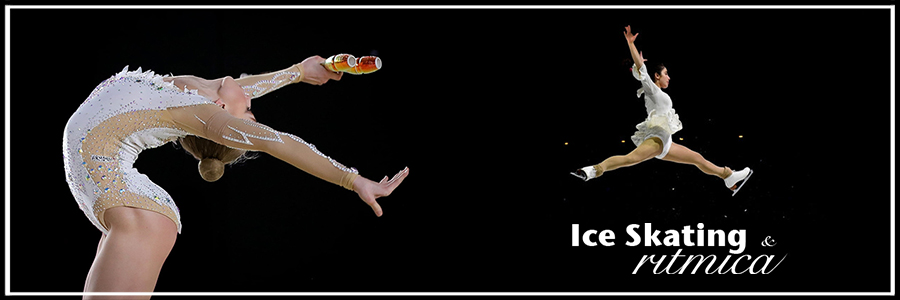-
Foffy-Gym.
User deleted
Scioltissima di gambe!!! 
Edited by Elettra_dancer - 21/8/2021, 02:10. -
Foffy-Gym.
User deleted
. -
Foffy-Gym.
User deleted
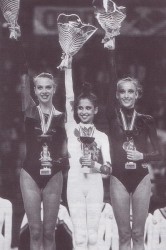


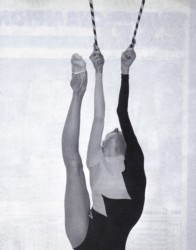
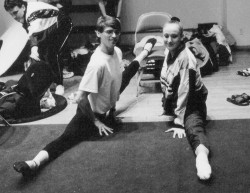 .
. -
Alessandraritmica.
User deleted
Amina è ufficialmente giudice di 3° categoria dal 29 novembre 2008! . -
.
Amina è stata allenatrice nazionale greca nel 1999.
Ora è una tra le principali allenatrice russe!
Amina Zaripova: "Margarita Mamun ha pronte le sue nuove quattro routines. Riguardo a Soldatova, è un po' più difficile: le abbiamo impostate tutte ma non siamo sicuri su tutti gli elementi ed uno dei suoi esercizi è particolarmente difficile, lo sente ma ha bisogno di lavorarci sopra molto. In più è un'adolescente, è suscettibile, può stancarsi molto rapidamente. Quindi il processo non è lo stesso, gli allenamenti sono un po' diversi. Irina Viner ha lasciato che si esibisse su una musica che ha sempre desiderato, quindi Sasha è molto felice di ciò.
Riguardo a Margarita, ora è il momento di scegliere i colori degli attrezzi ed i body, lei ama questa fase, è molto artistica e sicuramente molto sensibile. Grazie ai suoi nuovi esercizi avrete la possibilità di vederla più "fatale".
FonteCITAZIONEAmina Zaripova: "Margarita Mamun has now all her routines made. Regarding Aleksandra Soldatova, it is a bit harder : we have made them all, but we are not sure about all the elements, and one of her routine is extremely hard, she feels it but she needs to work on it a lot. Moreover she is a teenager, she is susceptible, she can be fed up very rapidly. So the process is not the same, trainings are a bit different. Irina Viner let her performing on a music she has always wanted to perform on, so Sasha is very happy about it.
About Margarita Mamun, it it now the time to choose the color of apparatus, the leotards, she loves that step, she is very artistic. And of course very sensitive. Thanks to of her new routine you will have the possibility to see her more "fatal". ". -
.

Video. -
.
Le espressioni di Amina a Rio sono diventate proverbiali!! 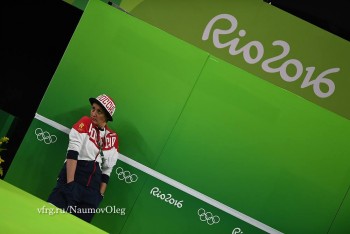
All'uscita dei punteggi di Rita: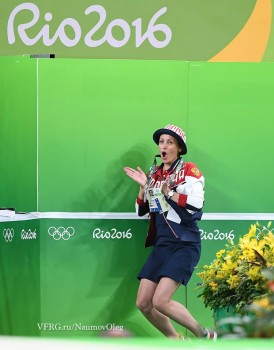
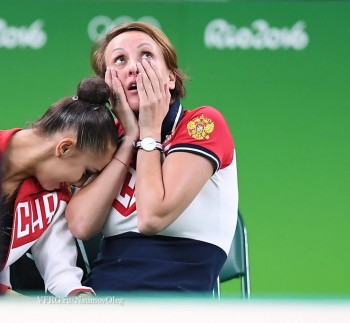
All'uscita del punteggio della squadra Russia al 6+2 finale: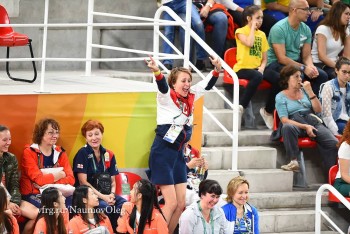
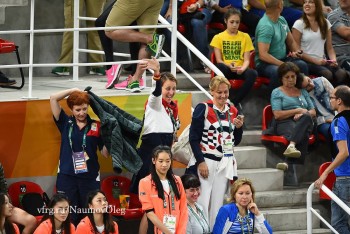 .
. -
.
Amina che "impazzisce" durante la premiazione di Rita 
Click per iniziare
. -
.
Amina Zaripova: “l'allenatrice cresce sempre con le sue ginnaste”
11.04.2020
Fonte
Interview & Producer: Angelina Krivova
Photographer: Daria Ratushina
MUAH: Daria Selivanova & Anastasia Kuznetsova
All'inizio della stagione di gare, il nostro staff editoriale ha parlato con Amina Zaripova, Onorata Allenatrice di Russia, che ha educato ginnaste come la ben conosciute Margarita Mamun e Yana Lukonina e continua nel suo lavoro con una nuova generazione di ginnaste – Maria Sergeeva, Daria Trubnikova e Diana Simoshina. Vogliamo scoprire come Amina è diventata essa stessa campionessa del mondo ed ora porta ginnaste ad alto livello, cercando di mantenere al tempo stesso la loro individualità e vero interesse nella vita.
Amina, per favore raccontaci com'è stata la transizione dalla carriera di atleta a quella di allenatrice. Hai deciso immediatamente di diventare coach, oppure no?
Sì, il cambiamento è stato graduale. All'inizio, non volevo tornare in palestra, perché gli atleti trascorrono tutto il loro tempo lì e alla fine della loro carriera molte persone vogliono davvero cambiare la situazione. Inoltre, sono stata invitata a NTV-Plus, dove mi hanno insegnato giornalismo. E, grazie a Dio, gli atleti partecipano a tali progetti perché lì, da un lato, provano qualcosa di nuovo, cambiano e, dall'altro, possono usare tutta l'esperienza e le conoscenze accumulate negli anni della loro carriera sportiva. Ma il giornalismo non mi piaceva, non era mio. Allo stesso tempo, ovviamente, per molto tempo ho cercato di imparare a vivere in un mondo completamente nuovo per me. È necessario capire che gli atleti si trovano nel loro mondo separato, che è molto diverso da quello che ognuno di noi deve affrontare quando termina una carriera sportiva. Dopo qualche tempo, il Centro di addestramento olimpico è stato aperto a Mosca e Irina Alexandrovna mi ha chiamato e mi ha offerto di provare a lavorare lì. Ho selezionato ginnaste promettenti e interessanti per me. E la mia carriera di allenatore è iniziata e continua ancora oggi.
Quando hai realizzato che il lavoro di allenatrice era la tua vocazione?
Nel complesso, ho realizzato la mia chiamata come allenatrice molto più tardi. Parallelamente alla ginnastica, ho provato a lavorare negli affari. Anche adesso è divertente per me ricordarlo; ho venduto collant e aperto ristoranti. Tutto ciò non ha avuto successo e alla fine mi sono resa conto che per me sarebbe stato meglio lavorare in palestra e stare con i bambini.
In che modo tu e Irina Zinovka riuscite a fare routine così interessanti e varie per le tue ginnaste? Avete una visione simile?
Ira è la mia persona non solo nel mondo della ginnastica ritmica, ma anche come uno spirito affine. Siamo d'accordo nelle opinioni, è comodo per me lavorare con lei. Certo, abbiamo disaccordi, discutiamo, ma fondamentalmente in queste controversie è nato qualcosa di interessante. È quasi impossibile litigare con Ira, perché è saggia e ha delle buone maniere.
Cosa c'era nella ginnastica del tuo periodo e cosa manca adesso?
Vedi, la ginnastica è sempre diversa. Nelle regole moderne, ad esempio, non mi piace che ci siano troppe acrobazie e, sfortunatamente, la ginnasta sta più della metà dell'esercizio sottosopra, non è visibile. Dopo le Olimpiadi, ci saranno nuove regole, spero che saranno ottimizzate. Voglio che la ginnastica sia più femminile, che l'immagine e lo sport debbano essere un tutto unico.
Qual è la caratteristica comune di tutte le tue ginnaste?
Per me, la cosa più importante è che devono essere gentili. Molte di loro lo sono e cerchiamo di tenere ciò dentro di loro.
Cosa ti interessa di più nel lavorare con le ragazze: l'artistico o la tecnica?
Ognuna a suo modo, perché i bambini sono diversi. In effetti, è più interessante lavorare sull'artistico, rivelare le loro immagini e farglielo fare ogni volta. Certo, l'umore di tutti è diverso, ma il mio compito è quello di andare sul palco e mostrare sempre la vera performance.
Diana Simoshina sa come ascoltare la musica, la sente ed è innato. Allo stesso tempo, crea contemporaneamente elementi complessi. Qui posso solo regolare, chiedere di renderlo più luminoso. Masha Sergeeva è nata per muoversi meravigliosamente, ha una plastica speciale. È più difficile lavorare con Dasha Trubnikova, perché è piuttosto caratteristica e testarda. Quando tuttavia mi ascolta, si compiace e, come dice Irina Aleksandrovna, "entra nel flusso" - può essere guardata e ammirata.
E qual è stata la cosa più difficile nel lavorare con Rita?
Il processo di allenamento con Rita non è stato difficile, è stato un piacere lavorare con lei. È stato difficile in termini di psicologia, abbiamo dovuto capirlo e assicurarci che nelle competizioni non facesse errori. Abbiamo lavorato molto, ma in un momento cruciale, alle competizioni, qualcosa è andato storto e lei ha perso. Se guardi la sua biografia, i suoi piazzamenti principali erano il secondo e il quinto. Ha avuto la possibilità di vincere i campionati europei e mondiali, ma ha commesso errori e l'unica competizione in cui ha eseguito tutto magnificamente è stata quella alle Olimpiadi.
Nella mia domanda a Rita, che ha sollevato in lei un'onesta e seria valutazione di se stessa sulla pedana, ha detto che era merito tuo. Come ci sei riuscita?
Non lo so, perché sono critica nei confronti del mio lavoro e, probabilmente, di ciò che le mie allieve stanno facendo. Anche se la mia ginnasta ha fatto bene, vedo ancora che da qualche parte il piede non è allungato o non ha portato la sua immagine fino alla fine. Sebbene sia stata fortunata in termini di immagini con loro, sono molto artistiche.
L'allenatore cresce sempre con le sue ginnaste, perché tutte le ragazze sono diverse e devi trovare un approccio per ognuna. Innanzitutto, ti abitui alla bambina, ti adatti a lei, trovi i pro e i contro, provi a trasformare i contro in pro. L'allenatore ha sempre un esame, quindi studia continuamente.
Gara: cosa significa per un allenatore?
E' l'esame di cui ho appena parlato. Esame sul lavoro fatto e non solo per l'allenatrice, ma anche per la ginnasta.
Cosa è impossibile insegnare a una ginnasta?
Tutto può essere insegnato, soprattutto, che dovrebbe esserci desiderio. Dipende da quali traguardi ed obiettivi sono stabiliti, perché ognuno ha i propri Giochi Olimpici. Per alcune ginnaste, è superare la paura e andare in pedana, per qualcuno vincere la prima categoria senior o persino imparare a creare una sorta di elemento.
Cosa significa essere responsabili nello sport?
Parlando di sport di altissimo livello, è necessario capire che le ragazze si esibiscono non solo per se stesse, ma anche per il loro paese. Questo è prestigioso, ma allo stesso tempo molto responsabile!
Non solo alleni le ragazze, ma vai anche al cinema, ai musei e ai teatri con loro. Dicci perché lo stai facendo?
Perchè no! Innanzitutto, è importante che tutti cambino, non solo le ginnaste. In secondo luogo, le ragazze vivono senza genitori in una base sportiva e, a parte la palestra e la loro stanza, non vedono nulla. Irina Aleksandrovna porta le ragazze al Teatro Bolshoi, ma io ho l'opportunità di diversificare visitando mostre e spettacoli. Faccio del mio meglio!
Qual è la cosa principale che una ginnasta dovrebbe imparare durante una carriera sportiva?
Imparare a sentire il loro corpo, a possederlo. E, naturalmente, la ginnastica non è solo la capacità di controllare il corpo, ma di coltivare il carattere e il duro lavoro. Dovrebbero anche capire che la ginnastica è solo l'inizio del viaggio della loro vita.
Qual è il ruolo di un allenatore dopo che il suo atleta ha completato una carriera sportiva?
È importante per me essere un'amica. Dovremmo essere partner mentre ci alleniamo e rimanere amici dopo, in modo che possano sempre venire da me per un consiglio, una richiesta. A volte posso persino consultare Rita su qualcosa.
E l'ultima domanda che faccio a tutti. La ginnastica ritmica è uno sport o un'arte?
La ginnastica ritmica è certamente una simbiosi. E' sport, perché le ragazze vanno su una pedana, gareggiano e ottengono i voti dei giudici per le routine ma è l'arte perché la ginnastica ritmica è sempre creatività.CITAZIONEAmina Zaripova: “The Coach Always Grows With Her Gymnasts”
11.04.2020
Interview & Producer: Angelina Krivova
Photographer: Daria Ratushina
MUAH: Daria Selivanova & Anastasia Kuznetsova
At the beginning of the competition season, our editorial staff spoke with Amina Zaripova, Honored Trainer of Russia, who educated such well-known gymnasts as Margarita Mamun and Yana Lukonina and continues by working with a new generation of gymnasts – Maria Sergeeva, Daria Trubnikova and Diana Simoshina. We are interested to find out how Amina Zaripova has become the winner of world championships herself, and now takes gymnasts to a high level, at the same time trying to maintain their individuality and true interest in life.
Amina, please tell us how the transition from a sports career to coaching was. You didn’t immediately decide to become a coach, did you?
Yes, the switch was gradual. At first, I didn’t want to return to the gym at all, because the athletes spend all their time in the gym, and at the end of their careers many people really want to change the situation around. Moreover, I was invited to NTV-Plus, where they taught journalism. And, Thanks God, that athletes participate in such projects because there, on the one hand, they try something new, switch, and on the other hand, they can use all the experience and knowledge accumulated over the years of their sports career. But I did not like journalism, it was not mine. At the same time, of course, for a long time I tried to learn how to live in a world completely new to me. It is necessary to understand that athletes are in their own separate world, which is very different from the one that each of us faces when ending a sports career. After some time, the Olympic Training Center opened in Moscow, and Irina Alexandrovna called me and offered to try to work there. I selected gymnasts who were promising and interesting to me. And my coaching career has begun and continues to this day.
When have you realized that the work of a coach is your calling?
As a whole, I realized my calling as a coach much later. In parallel with gymnastics, I tried to do business. Even now it’s funny for me to remember this; I sold tights and opened restaurants. All this was not successful, and, in the end, I realized that it is the best to work in the gym and be with children for me.
How do Irina Zinovka and you manage to make such interesting and varied routines for your gymnasts? Do you have similar views?
Ira is my person not only in the world of rhythmic gymnastics, but also as a kindred spirit. We agree in views, it is comfortable for me to work with her. Of course, we have disagreements, we argue, but basically in these disputes something interesting is born. It is almost impossible to quarrel with Ira, because she is wise and has very good manners.
What has been in gymnastics of your period and what is missing now?
You see, gymnastics is always different. In modern rules, for example, I do not like that there is too much acrobatics and, unfortunately, the gymnast is more than half the exercise upside down, it is not visible. After the Olympics, there will be new rules, I hope they will be optimized. I want the gymnastics to be more feminine, the image and the sport have to be a single whole.
What is the common feature of all your gymnasts?
For me, the most important thing is that they have to be kind. Many of them are, and we try to keep it in them.
What are you more interested in working with girls: artistry or techniques?
Each in its own way, because the children are different. In fact, it’s more interesting to work on artistry, to reveal their images and to have them do it every time. Of course, everyone’s mood is different, but my task is to go to the stage and always show the real performance.
Diana Simoshina knows how to hear music, she feels it, and it is innate. At the same time, she simultaneously makes complex elements. Here I can only adjust, ask to make it brighter. Masha Sergeyeva is born to move very beautifully, she has special plastic. It is more difficult to work with Dasha Trubnikova, because she is quite characteristic and stubborn. When she nevertheless listens to me, she fulfills and, as Irina Aleksandrovna says, “enters the stream” – she can be watched and admired.
And what was the most difficult thing to work with Rita?
The training process with Rita was not difficult, it was my pleasure to work with her. It was difficult in terms of psychology, we had to figure it out and make sure that in the competitions she would not make mistakes. We worked a lot, but at a crucial moment, at the competitions, something went wrong, and she lost. If you look at her biography, her main places were the second and the fifth. She had chances to win the European and World Championships, but she made mistakes, and the only competitions where she performed everything beautifully were the Olympic Games.
In my question to Rita, who raised in her an honest, sober assessment of herself on the carpet, she said that it was your merit. How did you achieve this?
I don’t know, because I am critical of my work and, probably, what my children are doing. Even if my gymnast did well, I still see that somewhere the foot is not stretched out, or she did not bring her image to the end. Although it was in terms of images that I was lucky with them, they are very artistic.
The coach always grows with her gymnasts, because all girls are different and you need to find an approach to each and every one. First, you get used to the child, adapt to them, find the pros and cons, try to turn the cons into pros. The coach has an exam every time, so you study continuously.
Competition, what does it mean for a coach?
That is the exam that I just mentioned. Exam on the work done and not only for the coach, but also for the gymnast.
What is impossible to teach a gymnast?
Everything can be taught, most importantly, that there should be desire. It depends on what goals and objectives are set, because everyone has their own Olympic Games. For some gymnasts, it is to overcome fear and go on the carpet, for someone to fulfill the first adult category, or even learn to make some kind of an element.
What does it mean to be responsible in sports?
Speaking about sports of the highest level, it is necessary to understand that girls perform not only for themselves, but also for their country. This is prestigious, but at the same time very responsible!
You not only train girls, but also go to the cinema, museums and theatres with them. Tell us why you are doing this?
Why not! Firstly, it’s important for everyone to switch, not just gymnasts. Secondly, girls live without parents at a sports base, and apart from the gym and their room, they see nothing. Irina Aleksandrovna takes the girls to the Bolshoi Theatre, but I have the opportunity to diversify this by visiting exhibitions and performances. I try my best!
What is the main thing that a gymnast should learn during a sports career?
Learn to feel their body, to own it. And, of course, gymnastics is not only the ability to control the body, therefore, to cultivate character and hard work. They should also understand that gymnastics is only the beginning of their life’s journey.
What is the role of a coach after his athlete has completed a sports career?
It is important for me to be a friend. We should be partners while we are training, and remain friends after, so that they can always come to me for advice, a request. Sometimes I can even consult with Rita about something.
And the last question I ask everyone. Is rhythmic gymnastics a sport or an art?
Rhythmic gymnastics is certainly a symbiosis. Sport, because girls go on the carpet, compete and get judges’ marks for the routines, and art, because rhythmic gymnastics is always creativity..
ZARIPOVA Amina (RUS) |
